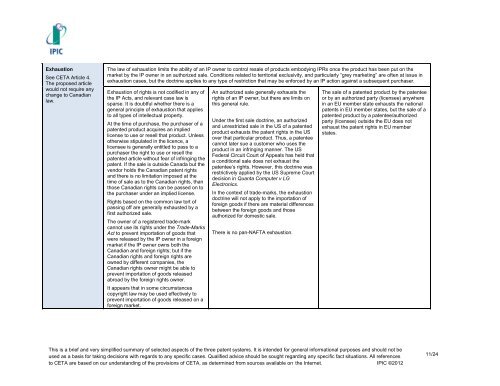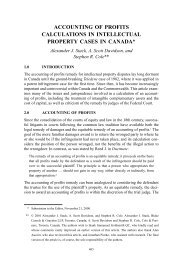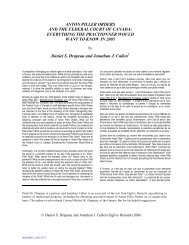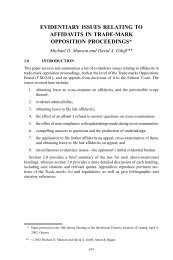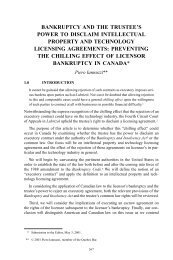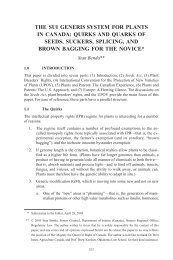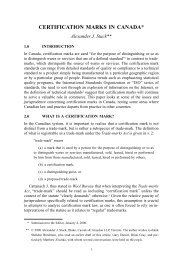A Comparative Overview of Canadian, US and European ...
A Comparative Overview of Canadian, US and European ...
A Comparative Overview of Canadian, US and European ...
Create successful ePaper yourself
Turn your PDF publications into a flip-book with our unique Google optimized e-Paper software.
Exhaustion<br />
See CETA Article 4.<br />
The proposed article<br />
would not require any<br />
change to <strong>Canadian</strong><br />
law.<br />
The law <strong>of</strong> exhaustion limits the ability <strong>of</strong> an IP owner to control resale <strong>of</strong> products embodying IPRs once the product has been put on the<br />
market by the IP owner in an authorized sale. Conditions related to territorial exclusivity, <strong>and</strong> particularly “grey marketing” are <strong>of</strong>ten at issue in<br />
exhaustion cases, but the doctrine applies to any type <strong>of</strong> restriction that may be enforced by an IP action against a subsequent purchaser.<br />
Exhaustion <strong>of</strong> rights is not codified in any <strong>of</strong><br />
the IP Acts, <strong>and</strong> relevant case law is<br />
sparse. It is doubtful whether there is a<br />
general principle <strong>of</strong> exhaustion that applies<br />
to all types <strong>of</strong> intellectual property.<br />
At the time <strong>of</strong> purchase, the purchaser <strong>of</strong> a<br />
patented product acquires an implied<br />
license to use or resell that product. Unless<br />
otherwise stipulated in the licence, a<br />
licensee is generally entitled to pass to a<br />
purchaser the right to use or resell the<br />
patented article without fear <strong>of</strong> infringing the<br />
patent. If the sale is outside Canada but the<br />
vendor holds the <strong>Canadian</strong> patent rights<br />
<strong>and</strong> there is no limitation imposed at the<br />
time <strong>of</strong> sale as to the <strong>Canadian</strong> rights, than<br />
those <strong>Canadian</strong> rights can be passed on to<br />
the purchaser under an implied license.<br />
Rights based on the common law tort <strong>of</strong><br />
passing <strong>of</strong>f are generally exhausted by a<br />
first authorized sale.<br />
The owner <strong>of</strong> a registered trade-mark<br />
cannot use its rights under the Trade-Marks<br />
Act to prevent importation <strong>of</strong> goods that<br />
were released by the IP owner in a foreign<br />
market if the IP owner owns both the<br />
<strong>Canadian</strong> <strong>and</strong> foreign rights; but if the<br />
<strong>Canadian</strong> rights <strong>and</strong> foreign rights are<br />
owned by different companies, the<br />
<strong>Canadian</strong> rights owner might be able to<br />
prevent importation <strong>of</strong> goods released<br />
abroad by the foreign rights owner.<br />
It appears that in some circumstances<br />
copyright law may be used effectively to<br />
prevent importation <strong>of</strong> goods released on a<br />
foreign market.<br />
An authorized sale generally exhausts the<br />
rights <strong>of</strong> an IP owner, but there are limits on<br />
this general rule.<br />
Under the first sale doctrine, an authorized<br />
<strong>and</strong> unrestricted sale in the <strong>US</strong> <strong>of</strong> a patented<br />
product exhausts the patent rights in the <strong>US</strong><br />
over that particular product. Thus, a patentee<br />
cannot later sue a customer who uses the<br />
product in an infringing manner. The <strong>US</strong><br />
Federal Circuit Court <strong>of</strong> Appeals has held that<br />
a conditional sale does not exhaust the<br />
patentee’s rights. However, this doctrine was<br />
restrictively applied by the <strong>US</strong> Supreme Court<br />
decision in Quanta Computer v LG<br />
Electronics.<br />
In the context <strong>of</strong> trade-marks, the exhaustion<br />
doctrine will not apply to the importation <strong>of</strong><br />
foreign goods if there are material differences<br />
between the foreign goods <strong>and</strong> those<br />
authorized for domestic sale.<br />
There is no pan-NAFTA exhaustion.<br />
The sale <strong>of</strong> a patented product by the patentee<br />
or by an authorized party (licensee) anywhere<br />
in an EU member state exhausts the national<br />
patents in EU member states, but the sale <strong>of</strong> a<br />
patented product by a patentee/authorized<br />
party (licensee) outside the EU does not<br />
exhaust the patent rights in EU member<br />
states.<br />
This is a brief <strong>and</strong> very simplified summary <strong>of</strong> selected aspects <strong>of</strong> the three patent systems. It is intended for general informational purposes <strong>and</strong> should not be<br />
used as a basis for taking decisions with regards to any specific cases. Qualified advice should be sought regarding any specific fact situations. All references<br />
WSLegal\049190\00037\8068137v1<br />
to CETA are based on our underst<strong>and</strong>ing <strong>of</strong> the provisions <strong>of</strong> CETA, as determined from sources available on the Internet. IPIC ©2012<br />
11/24


